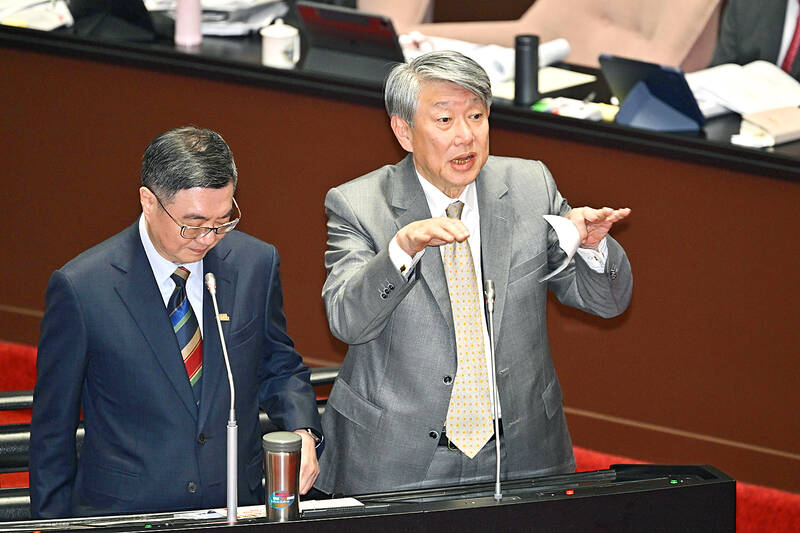The government will not accept “unfair” US tariffs on Taiwan’s chips, Minister of Economic Affairs J.W. Kuo (郭智輝) said yesterday.
Kuo declined to expand on the comments, saying that any elaboration might affect ongoing negotiations.
He described the tariff issue as a “negotiation strategy” of US President Donald Trump.

Photo: Tu Chien-jung, Taipei Times
It was more important to focus on what Trump hopes to gain, he said, adding that as the US president wants fair competition, tariff negotiations were the quickest route.
Kuo said he has hosted discussions with hundreds of businesses on US tariffs and their possible influence on domestic industries, providing Taiwan’s negotiators the basic demands and issues businesses have raised.
“Taiwan is helping your [trade partners] industries to make money, not making money from you,” he said, adding that it would benefit Taiwan’s participation in international technology and economic events if its trade partners understood that.
Deputy Minister of Economic Affairs Cynthia Kiang (江文若) visited the US earlier this month to collect information to more accurately pinpoint what Washington wants and enhance negotiations, Kuo said.
On Tuesday, he told the legislature that a 100 percent tariff was “not unnecessarily unreasonable,” a remark that has raised eyebrows by some people, but the minister did not elaborate on it yesterday.
US media have reported that Taiwan Semiconductor Manufacturing Co (TSMC, 台積電), the world’s largest contract chipmaker and a major supplier to US companies such as Apple Inc and Nvidia Corp, has been in talks for a stake in Intel Corp as pressures from Trump’s new policies toward Taiwan’s chip industry increase.
Neither TSMC nor Intel has confirmed the reports and the Ministry of Economic Affairs said it had not received information about any overseas investment application from TSMC.
Trump has accused Taiwan of taking away the US’ semiconductor business, saying he wants the industry to manufacture more in the US.
The ministry said in a statement yesterday that the government’s primary concern was fair practices that allow Taiwan to maintain its advantages over its competitors.
The Mainland Affairs Council also said in a statement that TSMC was an “important Taiwanese company.”
“In response to the challenges posed by Trump’s new policies toward our semiconductor industry and TSMC, our government will work closely with industry to maintain Taiwan’s leading position in the field of advanced technology,” the council said, without elaborating.
Additional reporting by Reuters

Taiwan will prioritize the development of silicon photonics by taking advantage of its strength in the semiconductor industry to build another shield to protect the local economy, National Development Council (NDC) Minister Paul Liu (劉鏡清) said yesterday. Speaking at a meeting of the legislature’s Economics Committee, Liu said Taiwan already has the artificial intelligence (AI) industry as a shield, after the semiconductor industry, to safeguard the country, and is looking at new unique fields to build more economic shields. While Taiwan will further strengthen its existing shields, over the longer term, the country is determined to focus on such potential segments as

UNCERTAINTY: Innolux activated a stringent supply chain management mechanism, as it did during the COVID-19 pandemic, to ensure optimal inventory levels for customers Flat-panel display makers AUO Corp (友達) and Innolux Corp (群創) yesterday said that about 12 to 20 percent of their display business is at risk of potential US tariffs and that they would relocate production or shipment destinations to mitigate the levies’ effects. US tariffs would have a direct impact of US$200 million on AUO’s revenue, company chairman Paul Peng (彭雙浪) told reporters on the sidelines of the Touch Taiwan trade show in Taipei yesterday. That would make up about 12 percent of the company’s overall revenue. To cope with the tariff uncertainty, AUO plans to allocate its production to manufacturing facilities in

COLLABORATION: Given Taiwan’s key position in global supply chains, the US firm is discussing strategies with local partners and clients to deal with global uncertainties Advanced Micro Devices Inc (AMD) yesterday said it is meeting with local ecosystem partners, including Taiwan Semiconductor Manufacturing Co (TSMC, 台積電), to discuss strategies, including long-term manufacturing, to navigate uncertainties such as US tariffs, as Taiwan occupies an important position in global supply chains. AMD chief executive officer Lisa Su (蘇姿丰) told reporters that Taiwan is an important part of the chip designer’s ecosystem and she is discussing with partners and customers in Taiwan to forge strong collaborations on different areas during this critical period. AMD has just become the first artificial-intelligence (AI) server chip customer of TSMC to utilize its advanced

Chizuko Kimura has become the first female sushi chef in the world to win a Michelin star, fulfilling a promise she made to her dying husband to continue his legacy. The 54-year-old Japanese chef regained the Michelin star her late husband, Shunei Kimura, won three years ago for their Sushi Shunei restaurant in Paris. For Shunei Kimura, the star was a dream come true. However, the joy was short-lived. He died from cancer just three months later in June 2022. He was 65. The following year, the restaurant in the heart of Montmartre lost its star rating. Chizuko Kimura insisted that the new star is still down